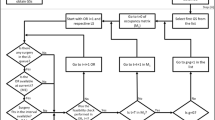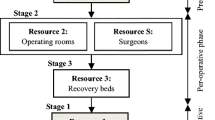Abstract
This study considers a combination of strategic and tactical levels of operating room planning where two types of full-day and half-day blocks are considered. Constraints on available beds in hospital wards and different durations of stay for elective patients in the ward are the main assumptions of the problem. The aim is to minimize overtime and idleness of operating rooms, maximize surgeons' satisfaction and minimize the number of unscheduled surgeries in the master surgery schedule. We propose a mixed integer programming model as well as a novel heuristic algorithm by combining simulated annealing meta-heuristic and linear programming models. Real data from a teaching-educational hospital with 20 operating rooms and 47 surgeons’ groups as well as some random problem instances are used in the experiments. The results indicate high performance of the proposed heuristic algorithm in generating near-optimal Pareto solutions compared with the mathematical model and a local search algorithm from the literature. Sensitivity analysis is done on some parameters of the problem like overtime cost of operating rooms, maximum allowable overtime, available beds in the ward, and the number of attendance days preferred by each surgeon. The results from our case study show that 6% of operating room costs are related to the fact that some surgeons are unwilling to perform surgeries on some days of a week. Also, adding 20% to the capacity of ward beds results in 3% and 10% decrease in unscheduled surgeries and operating rooms idleness, respectively.








Similar content being viewed by others
Data availability
The data that support the findings of this study are available from the corresponding author upon request.
References
Abedini, A., Li, W., & Ye, H. (2017). An optimization model for operating room scheduling to reduce blocking across the perioperative process. Procedia Manufacturing, 10, 60–70.
Aringhieri, R., Duma, D., Landa, P., & Mancini, S. (2021). Combining workload balance and patient priority maximisation in operating room planning through hierarchical multi-objective optimisation. European Journal of Operational Research. https://doi.org/10.1016/j.ejor.2021.07.033
Aringhieri, R., Landa, P., Soriano, P., Tànfani, E., & Testi, A. (2015). A two level metaheuristic for the operating room scheduling and assignment problem. Computers & Operations Research, 54, 21–34.
Astaraky, D., & Patrick, J. (2015). A simulation based approximate dynamic programming approach to multi-class, multi-resource surgical scheduling. European Journal of Operational Research, 245, 309–319.
Banditori, C., Cappanera, P., & Visintin, F. (2013). A combined optimization–simulation approach to the master surgical scheduling problem. IMA Journal of Management Mathematics, 24, 155–187.
Beliën, J., & Demeulemeester, E. (2007). Building cyclic master surgery schedules with leveled resulting bed occupancy. European Journal of Operational Research, 176, 1185–1204.
Cappanera, P., Visintin, F., & Banditori, C. (2014). Comparing resource balancing criteria in master surgical scheduling: A combined optimisation-simulation approach International. Journal of Production Economics, 158, 179–196.
Castro, P. M., & Marques, I. (2015). Operating room scheduling with Generalized Disjunctive Programming. Computers & Operations Research, 64, 262–273.
Choi, S., & Wilhelm, W. E. (2014). An approach to optimize block surgical schedules. European Journal of Operational Research, 235, 138–148.
Dellaert, N., & Jeunet, J. (2017). A variable neighborhood search algorithm for the surgery tactical planning problem. Computers & Operations Research, 84, 216–225.
Fei, H., Meskens, N., & Chu, C. (2010). A planning and scheduling problem for an operating theatre using an open scheduling strategy. Computers & Industrial Engineering, 58, 221–230.
Fügener, A. (2015). An integrated strategic and tactical master surgery scheduling approach with stochastic resource demand. Journal of Business Logistics, 36, 374–387.
Fügener, A., Hans, E. W., Kolisch, R., Kortbeek, N., & Vanberkel, P. T. (2014). Master surgery scheduling with consideration of multiple downstream units. European Journal of Operational Research, 239, 227–236.
Hoogeveen, J. A., Lenstra, J. K., & Veltman, B. (1996). Preemptive scheduling in a two-stage multiprocessor flow shop is NP-hard. European Journal of Operational Research, 89, 172–175.
Kamran, M. A., Karimi, B., & Dellaert, N. (2018). Uncertainty in advance scheduling problem in operating room planning. Computers & Industrial Engineering, 126, 252–268.
Kroer, L. R., Foverskov, K., Vilhelmsen, C., Hansen, A. S., & Larsen, J. (2018). Planning and scheduling operating rooms for elective and emergency surgeries with uncertain duration. Operations Research for Health Care, 19, 107–119.
Kumar, A., Costa, A. M., Fackrell, M., & Taylor, P. G. (2018). A sequential stochastic mixed integer programming model for tactical master surgery scheduling. European Journal of Operational Research, 270, 734–746.
Latorre-Núñez, G., Lüer-Villagra, A., Marianov, V., Obreque, C., Ramis, F., & Neriz, L. (2016). Scheduling operating rooms with consideration of all resources, post anesthesia beds and emergency surgeries. Computers & Industrial Engineering, 97, 248–257.
M’Hallah, R., & Al-Roomi, A. H. (2014). The planning and scheduling of operating rooms: A simulation approach. Computers & Industrial Engineering, 78, 235–248.
Mannino, C., Nilssen, E. J., & Nordlander, T. E. (2012). A pattern based, robust approach to cyclic master surgery scheduling. Journal of Scheduling, 15, 553–563.
Marques, I., & Captivo, M. E. (2017). Different stakeholders’ perspectives for a surgical case assignment problem: Deterministic and robust approaches. European Journal of Operational Research, 261, 260–278.
Marques, I., Captivo, M. E., & Barros, N. (2019). Optimizing the master surgery schedule in a private hospital. Operations Research for Health Care, 20, 11–24.
Meskens, N., Duvivier, D., & Hanset, A. (2013). Multi-objective operating room scheduling considering desiderata of the surgical team. Decision Support Systems, 55, 650–659.
Moosavi, A., & Ebrahimnejad, S. (2018). Scheduling of elective patients considering upstream and downstream units and emergency demand using robust optimization. Computers & Industrial Engineering, 120, 216–233.
Najjarbashi, A., & Lim, G. J. (2019). A variability reduction method for the operating room scheduling problem under uncertainty using CVaR. Operations Research for Health Care, 20, 25–32.
Oliveira, M., Visintin, F., Santos, D., & Marques, I. (2021). Flexible master surgery scheduling: Combining optimization and simulation in a rolling horizon approach. Flexible Services and Manufacturing Journal. https://doi.org/10.1007/s10696-021-09422-x
Penn, M. L., Potts, C. N., & Harper, P. R. (2017). Multiple criteria mixed-integer programming for incorporating multiple factors into the development of master operating theatre timetables. European Journal of Operational Research, 262, 194–206.
Riise, A., Mannino, C., & Burke, E. K. (2016). Modelling and solving generalised operational surgery scheduling problems. Computers & Operations Research, 66, 1–11.
Roshanaei, V., & Naderi, B. (2021). Solving integrated operating room planning and scheduling: Logic-based Benders decomposition versus Branch-Price-and-Cut. European Journal of Operational Research, 293, 65–78. https://doi.org/10.1016/j.ejor.2020.12.004
Saremi, A., Jula, P., ElMekkawy, T., & Wang, G. G. (2013). Appointment scheduling of outpatient surgical services in a multistage operating room department. International Journal of Production Economics, 141, 646–658.
Schiele, J., Koperna, T., & Brunner, J. O. (2021). Predicting intensive care unit bed occupancy for integrated operating room scheduling via neural networks. Naval Research Logistics (NRL), 68, 65–88. https://doi.org/10.1002/nav.21929
Shafaei, R., & Mozdgir, A. (2019). Master surgical scheduling problem with multiple criteria and robust estimation. Scientia Iranica, 26, 486–502.
Silva, T. A. O., de Souza, M. C., Saldanha, R. R., & Burke, E. K. (2015). Surgical scheduling with simultaneous employment of specialised human resources. European Journal of Operational Research, 245, 719–730.
Spratt, B., & Kozan, E. (2016). Waiting list management through master surgical schedules: A case study. Operations Research for Health Care, 10, 49–64.
Tànfani, E., & Testi, A. (2010). A pre-assignment heuristic algorithm for the Master Surgical Schedule Problem (MSSP). Annals of Operations Research, 178, 105–119.
van Oostrum, J. M., Van Houdenhoven, M., Hurink, J. L., Hans, E. W., Wullink, G., & Kazemier, G. (2008). A master surgical scheduling approach for cyclic scheduling in operating room departments. Or Spectrum, 30, 355–374.
Vancroonenburg, W., Smet, P., & Berghe, G. V. (2015). A two-phase heuristic approach to multi-day surgical case scheduling considering generalized resource constraints. Operations Research for Health Care, 7, 27–39.
Visintin, F., Cappanera, P., & Banditori, C. (2016). Evaluating the impact of flexible practices on the master surgical scheduling process: An empirical analysis. Flexible Services and Manufacturing Journal, 28, 182–205.
Xiao, G., van Jaarsveld, W., Dong, M., & van de Klundert, J. (2016). Stochastic programming analysis and solutions to schedule overcrowded operating rooms in China. Computers & Operations Research, 74, 78–91.
Zhang, Y., Wang, Y., Tang, J., & Lim, A. (2019). Mitigating overtime risk in tactical surgical scheduling. Omega. https://doi.org/10.1016/j.omega.2019.01.002
Zhou, B.-h, Yin, M., & Lu, Z.-q. (2016). An improved Lagrangian relaxation heuristic for the scheduling problem of operating theatres. Computers & Industrial Engineering, 101, 490–503.
Funding
This research did not receive any specific grant from funding agencies in the public, commercial, or not-for-profit sectors.
Author information
Authors and Affiliations
Corresponding author
Ethics declarations
Conflict of interest
The authors did not receive support from any organization for the submitted work.
Additional information
Publisher's Note
Springer Nature remains neutral with regard to jurisdictional claims in published maps and institutional affiliations.
Rights and permissions
Springer Nature or its licensor (e.g. a society or other partner) holds exclusive rights to this article under a publishing agreement with the author(s) or other rightsholder(s); author self-archiving of the accepted manuscript version of this article is solely governed by the terms of such publishing agreement and applicable law.
About this article
Cite this article
Kianfar, K., Atighehchian, A. A hybrid heuristic approach to master surgery scheduling with downstream resource constraints and dividable operating room blocks. Ann Oper Res 328, 727–754 (2023). https://doi.org/10.1007/s10479-023-05395-2
Accepted:
Published:
Issue Date:
DOI: https://doi.org/10.1007/s10479-023-05395-2
Keywords
- Operating room planning
- Master surgery schedule
- Mixed integer programming
- Hybrid simulated annealing
- Surgeons’ preferences
- Ward bed constraint




